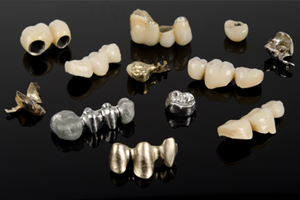Most dentists will agree that crown restorations are at the heart of general dentistry. We’ve all studied crowns in dental school, and some of us have done our best work replacing missing teeth and saving the rest.
Research has given us the wherewithal to achieve virtually ideal restorations. They are natural-looking, comfortable, and stable in the moist environment of the mouth. We’re better equipped than ever to build durable, long-lasting, and cosmetically superior crowns.
What is a crown?
A crown (or cap) is a restoration placed over a broken tooth that cannot sustain a conventional filling. By covering the biting surfaces and sides of the tooth, a crown strengthens the damaged tooth by binding together the remaining structures.
There are three basic kinds of full-crown restorations, each with pros and cons, depending on your situation.
Metal crowns are made of gold or alloys—they have the longest track record for durability, but some  people object to the look of metal.
people object to the look of metal.
Full porcelain crowns—and their ceramic cousins—look wonderful and fit well, but are usually best on front teeth where stress is not so high.
Porcelain-fused-to-metal crowns are our loyal work-horses for single-tooth restoration—they’re very sturdy and reliable.
There are elements of finesse in the creation of any crown. The fit is the thing. We create crowns with opposing teeth in mind, so a good bite won’t go back after we place the crown. The fit must accommodate adjacent teeth, too. And the “margin,” the part of the crown nearest the gum, must fit smoothly to protect the health of gum tissue.
And all this effort is to one end: to save a tooth.
When is a crown required?
- A tooth with multiple fillings experiences a crack, breaks off, or falls victim to secondary caries—a cavity under or around a filling.
- You’ve had root canal therapy on a molar, and it’s prone to brittleness.
- A tooth has suffered severe enamel wear.
- A high school athlete takes a blow in the mouth, and an otherwise healthy tooth experiences injury.
- You need an anchor for your new bridge.
